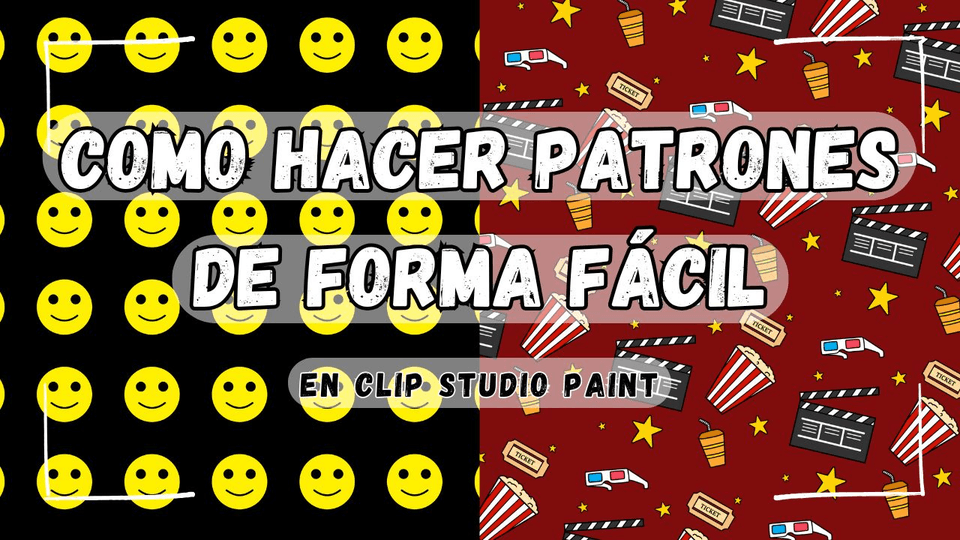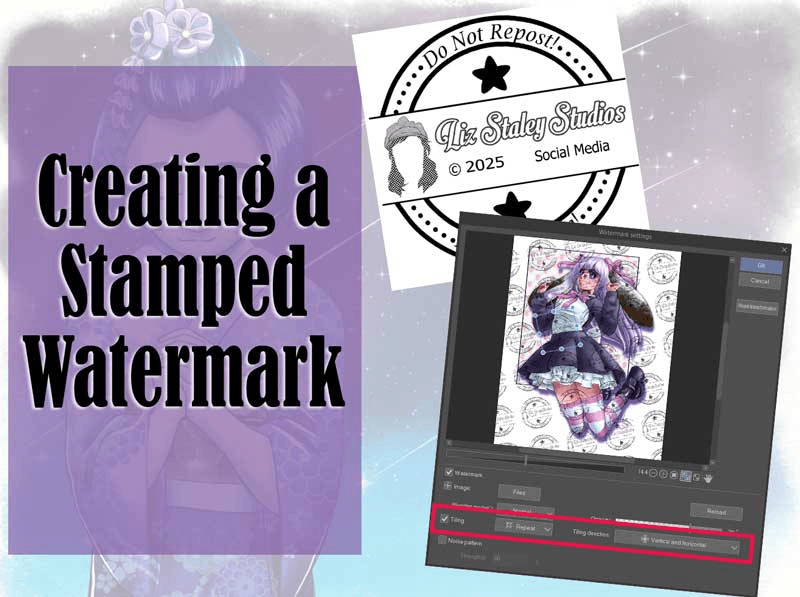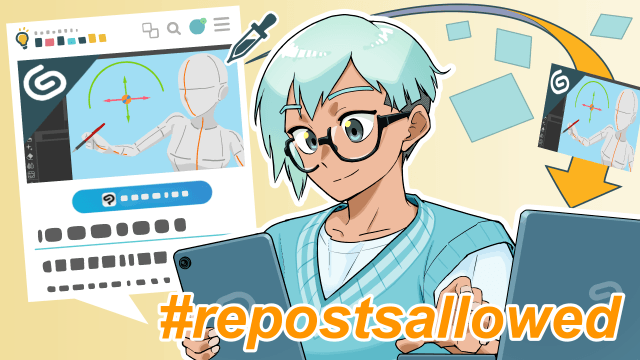7.Inking the Background
Compatible with Clip Studio Paint Ver. 3.1.0
Ink the background to complete the main lines of the background. Draw the background of Frame 1 using [Perspective ruler].
1 Select [Layer] menu → [Ruler - Frame] → [Create Perspective Ruler].
Configure the perspective ruler settings in the [Create Perspective Ruler] dialog box. [1 point perspective] is selected for this example.
2 The perspective ruler is created.
3 On the [Layer] palette, change the stacking order of the layers by dragging the "Perspective ruler 1" layer into the "Border" folder.
[Memo]
· Move any layers by dragging the grip on the right side of the layer when using the tablet or smartphone versions.
4 Adjust the vanishing point position of the perspective ruler you have created. Select the [Operation] tool → [Object].
5 As the eye level is tilted in the background of Frame 1, tilt the eye level of the perspective ruler based on the draft.
Select the handle for moving the eye level on the perspective ruler you have created and move the eye level so that it matches the horizon line drawn in the draft of Frame 1.
Drag the handle for changing the direction of the eye level so that it matches the angle of the horizon line.
6 Drag the guide line to adjust the vanishing point position according to the draft.
Adjust the vanishing point so that it is near where the character is standing.
7 Check that the [Snap to Special Ruler] icon on the upper command bar is turned on.
This allows you to snap the line to the perspective ruler.
[Memo]
[Snap to Special Ruler] is usually turned on automatically when a perspective ruler is created. Turn it off if you do not want to snap to the ruler.
8 Draw the background using the same [G-pen] as when drawing the characters. Check that black is set as the main color on the [Tool] palette.
9 Draw the background while snapped to the ruler.
1 0When you have finished drawing lines according to the perspective ruler, turn off [Snap to Special Ruler] on the command bar and add the character at the back and the small items such as the manga drafts scattered around the room.
The main lines of the background are complete.
Tips: Hiding the Perspective Ruler
The [Perspective ruler] is still shown after you finish drawing the background. To hide it, select the [Layer] palette → [Set showing area of ruler] and uncheck the check box.
Inking the Effect Lines
Draw effect lines such as saturated lines and stream lines.
<Saturated line>
Draw saturated lines in the background of Frame 1. The [Saturated line] tool will be used in this frame.
1 Select the [Comic] tool > [Focus lines] > [Dark saturated line(curve)].
2 Click to the right of the character in Frame 1 and specify the area using a curved line.
Double click to commit the curved line area you have created using [Dark saturated line(curve)].
The saturated lines are created.
3 Saturated lines created with the [Saturated line] tool can be adjusted later using the [Object] tool.
Select the [Object] tool on the [Tool] palette and drag the control points to adjust the area of the saturated lines. The density of the saturated lines is also too high by initial settings. While the [Object] tool is selected, adjust values such as the [Gap of line] on the [Tool Property] palette, checking the effect on the canvas.
[Memo]
Click the "+" mark on the [Tool Property] palette or [Layer Property] palette to display related settings.
4 The saturated lines in Frame 1 are now complete.
<Stream Lines>
Draw stream lines in the background of Frame 4. The [Special ruler] will be used in this frame.
1 Select the [Frame Border folder] on the [Layer] palette and click [New Raster Layer].
Change the layer name of the created layer to "Stream line".
2 Select the [Ruler] tool → [Special ruler] and select [Parallel line] from [Special ruler] on the [Tool Property] palette.
3 Click on the canvas to create the [Parallel line ruler].
4 Draw with the [Pen] tool.
Freehand lines will also become parallel lines according to the guide lines of the [Special ruler]. Vary the pen pressure so that the lines trail off to create stream lines (speed lines).
Tips: Moving the [Parallel line] in Special Ruler and Changing the Angle
You can change the [Parallel line] type of [Special ruler] to your desired angle and position. Move the [Parallel line] in special ruler by dragging on the lines of the ruler using the [Object] tool. Dragging the [Center of rotation] on the ruler changes the angle.
<Sea Urchin Balloons>
Create a sea urchin balloon.
1 Click the [Comic] tool and select [Flash] > [Dense flash] on the [Sub tool] palette.
2 Select the [Frame Border folder] on the [Layer] palette.
3 Drag on the image to draw a sea urchin balloon based on the draft.
4 Select the [Object] tool and configure the following settings on the [Tool Property] palette.
5 Correct the area where the balloon is covering the character.
On the [Layer] palette, select the "Saturated line" layer and click [Create layer mask].
It is not possible to draw with the [Pen] tool and [Eraser] tool on layers created using the [Saturated line] tool. Corrections therefore need to be made using the [Layer Mask] function.
[Memo]
Using the [Layer Mask] allows you to hide part of the content drawn on the layer.
For detailed information, please refer to the Instruction Manual.
Select the [Eraser] tool → [Hard] and trace along the area where the balloon is covering the character to mask the area.
The [Eraser] tool draws on the layer mask, meaning that while the balloon itself is not erased, it is hidden by the mask.
6 The sea urchin balloon is now complete.
[Memo]
Selecting [Comic] tools such as [Saturated line], [Stream line], or [Flash] allows you to draw various kinds of Focus lines and Speed lines easily by configuring the settings on the [Tool Property] palette. The [Ruler] tool also allows you to use features such as [Special ruler], which allows you to draw parallel lines, concentric circles or focus lines, and the [Perspective ruler], which enables accurate drawing of backgrounds, in addition to drawing shapes.
























Comment